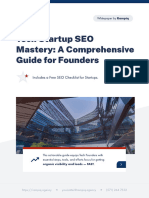Beginners Guide To SEO
Beginners Guide To SEO
Uploaded by
Faraz KhanCopyright:
Available Formats
Beginners Guide To SEO
Beginners Guide To SEO
Uploaded by
Faraz KhanOriginal Title
Copyright
Available Formats
Share this document
Did you find this document useful?
Is this content inappropriate?
Copyright:
Available Formats
Beginners Guide To SEO
Beginners Guide To SEO
Uploaded by
Faraz KhanCopyright:
Available Formats
Introduction to SEO
SEO stands for “search engine optimization.”
That’s a long phrase isn’t it? It can seem scary, but it doesn’t have it be.
Trust me, I was very intimidated by the term SEO when I started learning it
over a decade ago. I’m not scared of it anymore, but that is because I’ve
spent the time to learn about it and understand it.
This eBook is designed to teach you about the basics of SEO in an easy to
understand manner.
We are going to not just talk about the how of SEO. Instead, we’ll explore
the how and why. Knowing the why will help you understand the
importance of the how and you’ll be in a better place to apply this
knowledge to your own website or blog.
I’m not going to promise you SEO is easy, because it isn’t. You’re not going
to learn how to perform SEO in a few hours. SEO doesn’t work that way and
anyone who tells you otherwise is lying to you. I’ve seen books and courses
titled Simple SEO and Easy SEO. But guess what? They are 100% crap.
SEO is not simple and it is not easy. It is part art, part science, and part
instinct. But know this – once you get it, you get it and it becomes common
sense.
What I will promise you is that anyone and everyone can learn SEO.
Copyright ©2016 Web Savvy Marketing LLC, All Rights Reserved 2
With enough time and effort, SEO can be learned and mastered by virtually
anyone. I’ve witnessed it within myself and with others.
The question is not if you can learn SEO. The question is do you want to
learn it.
If the answer to that is yes, then let’s start exploring SEO and all that it has
to offer. I promise this journey will be rewarding and if you follow my
process, you will have great results.
Let’s Start at the Basics
SEO is simply the process of getting website traffic from “free” or “organic”
search results in search engines like Google, Bing, or Yahoo. All major
search engines have primary search results that are ranked based on what
the search engine considers most relevant to users. SEO helps maximize
the number of visitors to a particular website or page by ensuring that the
site appears high on the list of results returned by a search engine.
Here is Google’s definition of SEO:
Search engine optimization is often about making small
modifications to parts of your website. When viewed individually,
these changes might seem like incremental improvements, but when
combined with other optimizations, they could have a noticeable
impact on your site’s user experience and performance in organic
Copyright ©2016 Web Savvy Marketing LLC, All Rights Reserved 3
search results. You’re likely already familiar with many of the topics
in this guide, because they’re essential ingredients for any webpage,
but you may not be making the most out of them.
Notice how Google states they are small modifications? They are, but there
are many. But making changes together, in a planned and methodical
manner, can have big results.
SEO Factors Work In Combination With Each Other
An SEO factor is something that influences where a website or piece of
content will rank in search engines. No single SEO factor will produce top
search engine rankings. It is the combination of research, planning, and
optimization within the website and outside of the website that produces
results.
SEO factors have varying weights and no SEO consultant knows the exact
weight of each or when these weights change. We’re not going to talk about
every SEO factor. This is because Google has over 200 SEO factors and over
10,000 sub-signals for ranking. That is way too much information to digest
and remember.
And guess what? You don’t have to remember or even know all of the
factors that influence SEO. You need to learn about what is important and
why it matters. Once you have that down, the rest of the details fall into
place.
Copyright ©2016 Web Savvy Marketing LLC, All Rights Reserved 4
Why SEO is Vital to Your Website or Blog
If you’re like most website owners, at one time or another, you’ve asked if
your website really needs SEO. It’s a fair question, but one I can quickly
dismiss.
The majority of web traffic is driven by the major search
engines like Google, Yahoo! or Bing. Although social media and other types
of traffic can route users to your website, the bulk of website traffic is
driven by search engines. This statement is true regardless of your
website’s purpose.
Search engines are powerful because they provide targeted traffic. Or in
other words, search engines bring users that are seeking what you offer or
sell. Targeted website traffic provides revenue and exposure like no other
channel of marketing. Investing in SEO can have a much higher rate of
return when compared to other types of marketing efforts.
I have long believed in the power of organic SEO (organic meaning natural
and not paid). I’ve been using it for well over a decade and I’ve been
screaming it from the rooftop for over five years.
This isn’t just an idea or thought, it is a strong conviction that is rooted in
the core of who I am and it is central to what I believe. I know SEO works
because I’ve proven it. And I want to prove it to you.
Not convinced yet? Let’s look at some data. I love data!
Copyright ©2016 Web Savvy Marketing LLC, All Rights Reserved 5
Some Interesting Stats on Search
§ There are over 3.2 billion internet users in the world
§ There are over 1 billion websites in the world
§ There are over 16 million websites using WordPress
§ Google processes over 3.5 billion searches per day
§ Organic search drives 51% of all visitors to business-to-business and
business-to-consumer websites
§ Paid-search drives an average of 10% of traffic
§ Social drives an average of 5% of traffic
§ 89% of customers begin their buying process with a search engine
§ 50% of mobile searches visit a store within 1 day
Those are some powerful statistics that clearly show search is a
powerhouse of marketing that is worthy of your time.
SEO Offers Sustainable Growth and Long-Term Results
When you architect a website and you place SEO at the forefront of a web
project, you’re doing two things simultaneously. You’re making sure your
website will be usable by search engines and your actual website visitors.
And when I say usable, I mean that real people will search for content, find
your website, and learn from it.
Copyright ©2016 Web Savvy Marketing LLC, All Rights Reserved 6
They will do this because the search engines clearly understand your
content, how it is laid out, and they will know what terms would be the best
match for a given page or post.
When you incorporate real SEO into your website, you’ve made a conscious
decision to plant a seed, nurture that seed, and help it grow over time. This
long-term strategy and efforts produce high-quality results that continue
to produce results year and year.
For SEO to truly work and be sustainable, it needs to include a process of
build up. Any SEO consultant who says otherwise is fooling you. SEO is an
ongoing effort, but one that is totally worth it.
A Beautiful Website Doesn’t Matter if No One Can Find It
You need solid SEO to compete online and to obtain traffic. Period.
I’ve had companies show me a beautiful website that they spent lots of
money on, but completely forgot about SEO. Guess what happened in those
situations? They built it and no one came. No one saw the beautiful website
they spent months working on.
Beauty is important and usability is even more critical, however, neither
will work for your revenue stream if no one comes to the website.
SEO is the tool to drive people to your website.
Copyright ©2016 Web Savvy Marketing LLC, All Rights Reserved 7
The Anatomy of a Search Engine Results
Page (SERP)
A search engine results page (abbreviated to SERP) is the listing of results
returned by a search engine in response to a query for a keyword or phrase.
Search engines, like Google and Bing, will return many pages of content
results for a given search term.
There is a massive amount of content available on the internet, but none is
more important to website owners and marketers than search engine
results pages (SERPs).
Website owners all want their content to be placed at the top of page one of
search results. This is because very few website searches ever go beyond
page one of results.
In many cases, the higher you are on page one the more traffic you will
receive. The farther down your content is positioned on the page of results,
the fewer people will click on your content listing and visit your website.
In some industries, I have seen a drastic fall off of clicks once someone gets
past the first few listings. But this isn’t for all industries or searches.
The more complex the search term is, the more willing users are to explore
search listings beyond the first few positions.
Three Components of a Listing on SERP
Copyright ©2016 Web Savvy Marketing LLC, All Rights Reserved 8
Each listing on the SERP has three core components, which include the
page title, page description, and page URL. An example of this is given in
the image below.
The above search result was given for a basic search for the word plumber.
Let’s review the three items in more depth.
Page Title – This is the first line of a given result, in the example, it is blue
underlined which indicates it is a clickable text. This text comes from your
page’s title or meta title if they are being used. It is important for this text
to clearly represent the content and be easy to read and digest.
Description – This text is a description of the page’s content. It can come
from your page’s meta description (if populated) or it can be pulled from
within the page’s content itself. I have found Google will normally adhere to
what you have set up as a meta description if it adequately describes the
page and it matches the search used.
The interesting thing about the meta description is you can control this
and it is your first opportunity to reach website visitors. They see this well
before they reach your website or blog, so make sure this description is an
Copyright ©2016 Web Savvy Marketing LLC, All Rights Reserved 9
easy to read sentence and make sure you write it so it entices the visitor to
click through to the content.
URL – This is the actual address where the page lives. This isn’t super
important to the searcher, but is important to the search engines. In most
cases your URL should use actual words and you should avoid page IDs.
Looking Closer at Search Engine Results Pages
Every SERP is unique, even for search queries performed on the same
search engine using the same keywords or search queries. This is because
virtually all search engines customize the experience for their users by
presenting results based on a wide range of factors beyond their search
terms.
These factors can include such things as the user’s physical location,
browsing history, and social settings. In fact, two SERPs may appear
identical, and contain many of the same results, but will often feature
subtle differences.
The appearance of search engine results pages is constantly in flux due to
changes in the algorithm.
What the heck is an algorithm? I’m glad you asked.
An algorithm is a formula or calculation a search engine uses to decide who
appears within the SERP. Google, for example, has over 200 data points
or ranking signals.
Copyright ©2016 Web Savvy Marketing LLC, All Rights Reserved 10
The search engines are always trying to improve the quality of their results
and because of this, the ranking signals are adjusted daily. In most cases
these are very minor tweaks, but they are changes nonetheless.
A SERP typically contains two types of content – “organic” results and paid
results.
Organic results are listings of web pages that appear as a result of the
search engine’s algorithm and the content itself.
These results are based on the quality of content and how closely it
matches the search term or phrase used in the query.
Paid results are listings that are presented as a result of an advertiser
buying an ad. These are commonly called PPC or pay per click.
Copyright ©2016 Web Savvy Marketing LLC, All Rights Reserved 11
In our example search for a plumber, we are also seeing local results that
are being pulled from Google+ and Google maps. These change drastically
based on the physical location of the searcher.
Now if we want to get really crazy, we can start talking about knowledge
graph results. This is a results type that Google first introduced in 2012. It
Copyright ©2016 Web Savvy Marketing LLC, All Rights Reserved 12
pulls data to commonly asked questions from trusted sources and it
provides a concise answer to questions in one central location on the SERP.
In the above image, I had performed a query for What is WordPress and in
return Google gave me a brief answer and a link to further information.
This data was pulled from my friend Cory Miller’s website ithemes.com.
Cory’s website is displayed because he provides a great piece of content and
because he is a trusted source within the WordPress community. Cory’s
website has been around for over eight years and he is a major player in our
WordPress community.
While some people worry that this answer will stop searchers from clicking
through to a website, it really doesn’t. Users can see ithemes.com provides
a good answer, which entices them to click through to the page to read
more.
Copyright ©2016 Web Savvy Marketing LLC, All Rights Reserved 13
And guess what happens then? These same users will see that Cory sells a
ton of really great products for building WordPress websites and they’ll buy
something from him.
What just happened? The user gets a great response for his search, he buys
product from iThemes, which rewards Cory for writing killer content, and
the user is happy because the experience was positive.
This means they will continue to use Google for search. This makes Google
happy. When Google is happy, we’re all happy.
Finally, we have what is called related searches. Related searches are
Google’s suggestions on other search terms a user might want to consider
for a given phrase or word.
In our example for the plumber search, Google also suggested the following
terms as illustrated in the image above. Search phrases like 24-hour
plumber or plumber reviews would make a nice search if I needed to find a
new plugin. Thanks Google!
Copyright ©2016 Web Savvy Marketing LLC, All Rights Reserved 14
I feel these related phrases are important and I use them in keyword
research and in creating my seed list of phrases.
What Does All This Mean to Website Owners?
As you look at the above examples, don’t be concerned if you feel like you
don’t have all the variances mastered. These variations simply mean you
have more opportunities to show up on the SERP.
In my mind, winning in organic SEO is about doing the right thing and
making your best effort to think like Google.
The more you focus on Google and doing the right thing for website visitors,
the more you’ll win at SEO.
So don’t be intimidated by all of this information. Let it empower you to
learn best practices and learn the right way to create and optimize
websites.
Copyright ©2016 Web Savvy Marketing LLC, All Rights Reserved 15
What’s Important in SEO
If I’ve convinced you of the importance of SEO, you’re probably starting to
wondering how you perform SEO and what it entails. These are valid
thoughts and important ones too.
SEO isn’t magic or voodoo. I know some SEO consultants will make you
believe they possess magical powers and only they can optimize your
website, but don’t listen to them.
With a good education, you can learn how to weave SEO best practices into
your website. You can perform DIY SEO if you have the right education and
you get yourself on the right path.
Over the last decade, I’ve had lots of success with SEO on my website and
that of my clients. In all cases, I did the right things and I stayed clear away
from tactics that offered quick returns or were geared towards
manipulating Google.
Okay well, I one time I did try some less than stellar tactics and Google
promptly booted me out of their index. That was a great learning lesson
and one I will never forget.
But we won’t focus on my failures. Instead, let’s focus on the wins and
review what was done right so you can learn what really matters with SEO.
Copyright ©2016 Web Savvy Marketing LLC, All Rights Reserved 16
My SEO Case Study from 2009
When I first started Web Savvy Marketing back in 2009 I had a client who
quadrupled search traffic and doubled the company’s revenue in one year.
Guess what? It was due to SEO!
That’s pretty exciting, right? Imagine if you could do the same to your
website.
Before you get too excited, let me qualify this by saying Eric, the company
president, did everything I asked and adhered 100% to my SEO advice. It
was the perfect situation and this created exceptional results.
Sadly this isn’t the norm. When I consult with companies on SEO, they
don’t generally follow my advice entirely and they also typically fail to
deliver on their promises and their deliverables. This isn’t out of lack of
desire, but out of lack of focus. They have businesses to run and real world
issues outside of their SEO efforts. This hampers our success.
That all being said, SEO can work and I want to review what we did for
Eric’s website and how we made such a huge impact in only twelve months.
First of all, we didn’t participate in any link schemes, comment spamming,
paid links or advertising banners. We simply focused on providing quality
content, while also letting organic SEO and visitor personas lead the way.
We tried to consider what our visitors would perceive as valuable content
Copyright ©2016 Web Savvy Marketing LLC, All Rights Reserved 17
and we tried to make sure we looked at all personas (or visitor types) that
came to the website.
While this list won’t cover everything we did, it will hit the SEO highlights:
§ Performed a complete keyword discovery prior to writing content and
website launch
§ Selected three critical keywords, ten high additional high traffic
keywords, and a bunch of long-tail keywords
§ Mapped out the website and blog based on visitor personas and our
targeted keywords
§ Created a new WordPress website with an integrated blog
§ Focused on a one keyword per page strategy
§ Created strong content for each page that had keyword focus
§ Created unique and optimized meta titles and meta descriptions for
all keyword focused content
§ Created deep internal links through pages and blog posts
§ Utilized social media for link building and building a brand
§ Performed an inbound linking campaign with very targeted pages and
keywords
§ Made sure we had a diverse set of new content being added to the
website each week
§ Worked on other, varied off-site tactics to build company branding
and position Eric as the thought leader in his industry
Our keyword rich content included the following types of distribution:
Copyright ©2016 Web Savvy Marketing LLC, All Rights Reserved 18
§ Two to three blog posts per week
§ Press releases
§ Webinars
§ Polls
§ YouTube videos
§ Industry reports
§ White papers
§ Podcasts
§ An industry directory with rating system
§ Weekly newsletters
All of this together created the perfect storm of SEO activity.
The client’s website ranked and ranked well. Our content ranked higher on
SERP then major companies like Microsoft and it did so because we had a
clearly defined strategy and that we closely followed and executed.
Here is the secret sauce to this entire yearlong campaign:
§ We focused on doing the right thing and helping Google do its job.
§ We followed Google’s guidelines.
§ We wrote quality content.
§ We used off-site tactics to help promote what we were doing onsite.
§ We were consistent and we followed a well-documented plan.
While the tactics above will shift some – it is years later after all – the core
concept stays the same.
Copyright ©2016 Web Savvy Marketing LLC, All Rights Reserved 19
Common Mistakes and Challenges
While there are lots of ways people can get off track with search engine
optimization, here are a few very common issues I see. The good news is
each item can be avoided.
#1 – Lack of Education
SEO isn’t something you learn overnight. If you want to perform your own
SEO, you need to educate yourself. I’ve spent almost fifteen years
learning about SEO and I’m thankful I did because I feel each hour of
learning has paid itself back over and over again.
When thinking about education, consider the following places and types of
content:
Reputable SEO Consultants
§ Online courses
§ In-person seminars and classes
§ Blog posts
§ SlideShare presentations
§ White papers
§ Webinars
§ Twitter announcements
Copyright ©2016 Web Savvy Marketing LLC, All Rights Reserved 20
§ Getting started guide
§ Blog
§ YouTube videos
§ Webmaster forum
Trial and Error
§ Set up a blog or website you can play with
§ Test out theories on SEO
§ Wait
§ Check and see status
§ Compare and contrast your efforts
§ Document results
#2 – Lack of Planning
Really good SEO is a process and it requires a detailed and well thought out
plan. You cannot expect to execute quality SEO without listing out what
you’re going to do, documenting yourself along the way, and executing step
by step.
You can plan on paper, in Word, or in a project management software
package like Basecamp, which is what I use. The key is to know your steps
and then follow these steps in order.
#3 – Ignoring Off-site Factors
For SEO to work, the search engines must see off website activity. This
means other websites need to mention you and/or link to you. This can be
Copyright ©2016 Web Savvy Marketing LLC, All Rights Reserved 21
derived from a variety of activities, but someone other than your mom
needs to know your website or blogs exists.
If you’re a nationally focused website, social media helps with this greatly.
This would include popular networks like Facebook, Twitter, LinkedIn,
Pinterest, Instagram, and Google+.
If you’re a locally focused website, social media is still important but so is
local directory listings and interaction with your local community.
#4 – Unrealistic Expectations
SEO takes time, resources, and money if you outsource. You need to go into
this journey expecting to spend time working on SEO for the long-term.
SEO is a long-term commitment that offers long-term results. Know that
good SEO isn’t going to take a few days and you won’t see huge results in
weeks. SEO takes months, but the benefits last for years.
If you can’t make the long-term commitment needed, consider spending
your money on pay per click ads.
#5 – Hiring Crappy SEO Consultants
Good SEO consultants are hard to locate and they are even harder to hire.
This is because there aren’t a lot of high-quality SEO consultants available
Copyright ©2016 Web Savvy Marketing LLC, All Rights Reserved 22
for hire. There are lots and lots of bad SEO consultants or young
entrepreneurs who think they know SEO.
Be careful. What you don’t know can and will hurt you.
Here are my tips for reviewing and hiring SEO consultants:
§ Make sure any SEO consultant you hire has years of real-world SEO
experience.
§ Make sure their own website easily shows up in search.
§ Ask for examples of their work.
§ Ask lots of questions.
§ Know what they are going to do and don’t accept non-answers on their
direction.
§ Expect to pay top dollar for a high-quality consultant.
Google has even more tips and you can find them at:
https://support.google.com/webmasters/answer/35291?hl=en
Copyright ©2016 Web Savvy Marketing LLC, All Rights Reserved 23
The Next Steps on Your SEO Journey
This eBook was designed to give you an overview of search engine
optimization, and more importantly, why it matters to your website or
blog.
I hope it has provided a better understanding of SEO and empowered you
to feel more in control of your online destiny.
That all said, this is just the beginning.
You now have to continue your education of SEO and use this introductory
knowledge as a foundation for optimizing your own web property. In doing
so, you can learn about SEO and perform SEO yourself or you can hire a
third party consultant to help.
Both are great options, but as I’ve cautioned you above, make sure you use
credible resources that have proven, real-world knowledge in search engine
optimization.
If you’d enjoyed this eBook and you’d like to have additional SEO education
in the same type of easy to use information, consider signing up for our
online SEO course at DIYSEOcourses.com.
The online course is self-paced and offers a full eight hours of education in
the form of videos, written tutorials, template downloads, and quizzes.
Copyright ©2016 Web Savvy Marketing LLC, All Rights Reserved 24
About the Author
My name is Rebecca Gill. I’m the
founder of Web Savvy Marketing and
the SEO instructor at
DIYSEOcourses.com.
It’s great to virtually meet you!
SEO is a passion of mine and my goal is
to help you take control of your online
destiny by teaching you how efficiently
and effectively use search engine
optimization to drive free traffic to your
website or blog.
I love SEO and all of the opportunities it offers to bloggers and website
owners. I want to share this love of SEO with you and help show you what
SEO can do for your website or blog.
I’d like to take a moment and give you a brief overview of me and my
personal history. I think it is important for you to know a little bit about me
so you can see what drives me and what fuels my approach to SEO.
The Backstory
I’ve been working with sales, marketing, and SEO for almost twenty years.
Copyright ©2016 Web Savvy Marketing LLC, All Rights Reserved 25
I start there because you need to know I’ve been doing this for a while and
my eBook, blog posts, and online SEO courses are based on two decades of
education and real-world experience.
While I am very fond of sales and marketing as a whole, I love SEO. I always
have and I’m quite sure I can attribute this love of SEO to my upbringing
and personal history.
I had a very non-traditional childhood and for much of it, I lived with my
grandparents in a small town in northern Michigan. My Grandmother was
a significant influence in my life and she taught me many things as she
raised me.
One of the core concepts my Grandmother instilled in me was the value of
hard work and doing the right thing.
This may seem irrelevant, but if you work with me on an SEO consulting
project or take one of my SEO courses, you’ll discover this is the focus of
everything I do.
I never take the easy route in anything. Instead, I evaluate the situation –
many times with data – and I choose the path of hard work and long-term
results. And, as a baseline of everything I do, I make sure I live true to my
values along the way.
In business, and particularly the internet, I believe this is even more
important.
Copyright ©2016 Web Savvy Marketing LLC, All Rights Reserved 26
Everything I’ve done in SEO has been focused on this pursuit of the right
path and the honorable path. Work hard, do the right thing for the visitor,
and live by the rules set forth by the search engines.
My success in website promotion was started early with my Grandmother
in that small northern Michigan town and it lives strong within me today.
She taught me life wasn’t full of shortcuts and that true success was
derived from planning and hard work. I want to show you how this
philosophy applies to SEO and how it can help grow your website or blog
traffic.
This eBook, my free blog posts, and my SEO courses are designed to teach
you to do just that!
Succeed with internet marketing by working hard, smart, and always
staying focused on the visitor and creating a positive user experience.
Learning SEO and applying it to your website or blog is about working
hard. If you pursue this path with earnest, you’ll be rewarded for your
efforts.
Copyright ©2016 Web Savvy Marketing LLC, All Rights Reserved 27
You might also like
- SEO Strategy For ?????Document5 pagesSEO Strategy For ?????Corona TVNo ratings yet
- Seo PackagesDocument9 pagesSeo PackagesAlpha InsightNo ratings yet
- How To Make Money From Face BookDocument4 pagesHow To Make Money From Face BookSandip Dutta100% (3)
- What Is Seo?: SEO Drives Relevant Audience With High Conversion RatesDocument5 pagesWhat Is Seo?: SEO Drives Relevant Audience With High Conversion RatesShashank Cooled RanaNo ratings yet
- Caterpillar SEODocument15 pagesCaterpillar SEOJimmy OmbomNo ratings yet
- Learning SEO From The Experts:: A Step-By-Step GuideDocument22 pagesLearning SEO From The Experts:: A Step-By-Step GuideDhawal BarotNo ratings yet
- First Steps To Finding Direct ClientsDocument13 pagesFirst Steps To Finding Direct ClientsLuciana PaganoNo ratings yet
- 2.1.1 Introduction To Off Page SEODocument23 pages2.1.1 Introduction To Off Page SEOgomajaf572No ratings yet
- Digital Marketing SEO & SemDocument15 pagesDigital Marketing SEO & SemRaja SoccerNo ratings yet
- SEO Mistakes To AvoidDocument5 pagesSEO Mistakes To AvoidAgnes PachecoNo ratings yet
- SEO Content Maketing, General SEO What Is Seo Content?Document50 pagesSEO Content Maketing, General SEO What Is Seo Content?Kamila KusmeinarNo ratings yet
- Website and SEODocument5 pagesWebsite and SEOtechno deepNo ratings yet
- The Process of Keyword Research: by Nona Nada DamanikDocument7 pagesThe Process of Keyword Research: by Nona Nada DamanikdebedeNo ratings yet
- All About SEODocument1 pageAll About SEOtopwebsite 2No ratings yet
- BLANK - SEMrush On-Page SEO Template - Make A Copy To EditDocument287 pagesBLANK - SEMrush On-Page SEO Template - Make A Copy To Editsantosh kumar0% (1)
- Google Discover SEO 1711043609Document55 pagesGoogle Discover SEO 1711043609jdyfsjvbd9No ratings yet
- Austin SEO ServicesDocument4 pagesAustin SEO ServicesTasty SEONo ratings yet
- Master SEODocument8 pagesMaster SEOOkane MochiNo ratings yet
- Introduction To Media Planning: By: Usman QayamDocument27 pagesIntroduction To Media Planning: By: Usman QayamAssam AltafNo ratings yet
- Think Before You WriteDocument2 pagesThink Before You WriteAkhila YennaNo ratings yet
- SEO Training BrochureDocument5 pagesSEO Training BrochureSanthoshKumarNo ratings yet
- 7 Best Types of Engineering Courses To Study - Karpagam Institute of TechnologyDocument4 pages7 Best Types of Engineering Courses To Study - Karpagam Institute of TechnologyKarpagam Institute of TechnologyNo ratings yet
- SEO (Search Engine Optimization)Document17 pagesSEO (Search Engine Optimization)Mrityunjay Sharma100% (1)
- BONUS Hoth SEO Leads ChecklistDocument6 pagesBONUS Hoth SEO Leads Checklistd3mill NepalNo ratings yet
- Holistic Seo: Yoast Seo For Wordpress Training - Lesson 1.1Document16 pagesHolistic Seo: Yoast Seo For Wordpress Training - Lesson 1.1Mohit RuhalNo ratings yet
- Freelancer GuideDocument33 pagesFreelancer Guidemillene.rodriguesNo ratings yet
- SEO Keyword Ranking 20120601 00Document23 pagesSEO Keyword Ranking 20120601 00urangutan74No ratings yet
- Content Marketing Writing SecretsDocument52 pagesContent Marketing Writing SecretsSilvia Holding CompanyNo ratings yet
- Sponsorship PacketDocument6 pagesSponsorship PacketMichelle SokolNo ratings yet
- SEO For Beginners 1 3 The Yoast SEO Plugin PDFDocument10 pagesSEO For Beginners 1 3 The Yoast SEO Plugin PDFshainul rizviNo ratings yet
- Instagram MarketingDocument23 pagesInstagram MarketingweergjkwefNo ratings yet
- GD Course Calender (1) - Week DaysDocument7 pagesGD Course Calender (1) - Week DaysFarhad AhmedNo ratings yet
- Advertising at Unit 4Document87 pagesAdvertising at Unit 4Tanya GrewalNo ratings yet
- FiverrDocument2 pagesFiverrShanila AkhterNo ratings yet
- KDP AmazonDocument7 pagesKDP AmazonNuaim AbrarNo ratings yet
- Monthly SEO Report TemplateDocument7 pagesMonthly SEO Report TemplateRavneet SinghNo ratings yet
- Add Text After or Before Product Title in WoocommerceDocument1 pageAdd Text After or Before Product Title in WoocommerceAman MehraNo ratings yet
- The Ultimate SEO ChecklistDocument15 pagesThe Ultimate SEO ChecklistRares DraganNo ratings yet
- The Ultimate Resources For Freelance WritersDocument2 pagesThe Ultimate Resources For Freelance Writersnataliesndrs38No ratings yet
- Social Media Content CalendarDocument27 pagesSocial Media Content CalendarSTAR SPNo ratings yet
- Social Media Optimization - Manage and Measure Your Social Media Marketing To Grow Your BusinessDocument4 pagesSocial Media Optimization - Manage and Measure Your Social Media Marketing To Grow Your BusinessAndrew Strickman100% (1)
- Website Preliminary Analysis & SEO Proposal: Search Engine Optimization (SEO)Document23 pagesWebsite Preliminary Analysis & SEO Proposal: Search Engine Optimization (SEO)Pinakin PatelNo ratings yet
- Linked: The B2B Marketing PlatformDocument36 pagesLinked: The B2B Marketing PlatformWijaksana DewaNo ratings yet
- Best & Creative Digital Marketing Agency in Malad, Mumbai, India.Document18 pagesBest & Creative Digital Marketing Agency in Malad, Mumbai, India.magnarevodigitalNo ratings yet
- A Guide To GA4 EbookDocument30 pagesA Guide To GA4 Ebookg86tmdkwx7No ratings yet
- SEO Audit TemplateDocument5 pagesSEO Audit TemplateYoh KatoNo ratings yet
- Wix Ebook Digital Agencies in 2020Document29 pagesWix Ebook Digital Agencies in 2020Anonymous r7uG0cNo ratings yet
- For Web DesingDocument7 pagesFor Web DesingJaime GuevaraNo ratings yet
- B2B Lead Generation WPDocument8 pagesB2B Lead Generation WPFiras SafieddineNo ratings yet
- Seo 3Document29 pagesSeo 3Ur AmanNo ratings yet
- Seo PDFDocument18 pagesSeo PDFkonjnabelomprincuNo ratings yet
- Digital ProductsDocument4 pagesDigital Productssybilblanchett95No ratings yet
- Tech Startup SEO Mastery - A Comprehensive Guide For Founders (Plus Free SEO Checklist) - Whitepaper by RampiqDocument44 pagesTech Startup SEO Mastery - A Comprehensive Guide For Founders (Plus Free SEO Checklist) - Whitepaper by RampiqanalyticsNo ratings yet
- Web Technology BrochureDocument11 pagesWeb Technology BrochureGhanshyam SharmaNo ratings yet
- FIGMADocument22 pagesFIGMACessNo ratings yet
- Seo Audit: Seo Analysis - Tool KitDocument2 pagesSeo Audit: Seo Analysis - Tool KitAyushi BahugunaNo ratings yet
- 25 Search Engine Optimization SEO Steps To Google Ranking B08PYK54SVDocument209 pages25 Search Engine Optimization SEO Steps To Google Ranking B08PYK54SVMeng ZouNo ratings yet
- SEO Trends 2021Document215 pagesSEO Trends 2021Vinaypn BangaloreNo ratings yet
- Welcome To SEO For Beginners - Your Comprehensive Guide!Document22 pagesWelcome To SEO For Beginners - Your Comprehensive Guide!vn vvvvNo ratings yet
- Google LLC Is An American: o o o o o o oDocument3 pagesGoogle LLC Is An American: o o o o o o onacenkNo ratings yet
- GFL TipsDocument3 pagesGFL TipsMeltyNo ratings yet
- Roland e 38Document102 pagesRoland e 38JBtec treinamentosNo ratings yet
- Dongfeng Cummins 4BTA 3.9-G2 ManualDocument461 pagesDongfeng Cummins 4BTA 3.9-G2 ManualfrancisNo ratings yet
- How To Do SEO in HindiDocument2 pagesHow To Do SEO in HindiChirag JoshiNo ratings yet
- Hickleton and Thurnscoe Halt Railway StationDocument2 pagesHickleton and Thurnscoe Halt Railway StationMoshe RubinNo ratings yet
- On Page SEO Report - Check SEODocument5 pagesOn Page SEO Report - Check SEOprithika rajendranNo ratings yet
- Tense Review PDFDocument2 pagesTense Review PDFMuhammad JameelNo ratings yet
- The Search EngineDocument66 pagesThe Search EngineKrizza Mae CalimagNo ratings yet
- Drop BoxDocument3 pagesDrop Boxjefferson galarzaNo ratings yet
- Analytics All Web Site Data Audience Overview 20210901-20210930Document1 pageAnalytics All Web Site Data Audience Overview 20210901-20210930AX ACNo ratings yet
- MKT905 Detailed NotesDocument36 pagesMKT905 Detailed NotessjNo ratings yet
- Curs Europa Şi LumeaDocument18 pagesCurs Europa Şi LumeaDragos VladauNo ratings yet
- Riccar R1850 Sewing Machine Instruction ManualDocument45 pagesRiccar R1850 Sewing Machine Instruction ManualiliiexpugnansNo ratings yet
- Loving You For ClientDocument1 pageLoving You For Clientemmanuelsaturday557No ratings yet
- Black Yellow Illustrated Professional SEO PresentationDocument15 pagesBlack Yellow Illustrated Professional SEO PresentationNursyifa AzizahNo ratings yet
- InformationDocument2 pagesInformationravis.reddy7629No ratings yet
- Appendix A GPDPNHS Library Management System Appendix B City of Baguio WebsiteDocument5 pagesAppendix A GPDPNHS Library Management System Appendix B City of Baguio WebsiteJOMARCK PERUCHONo ratings yet
- SEODocument128 pagesSEONaughtygadget100% (4)
- Employment Agencies in Duba 4Document4 pagesEmployment Agencies in Duba 4William MorganNo ratings yet
- 心理年齡測試Document1 page心理年齡測試紅小姐No ratings yet
- Uber Suggest: Track and Improve Your SEO TrafficDocument8 pagesUber Suggest: Track and Improve Your SEO TrafficSaravana Priyan MNo ratings yet
- Aspek Imun Pemphigus VulgarisDocument6 pagesAspek Imun Pemphigus VulgarisAdeliaNo ratings yet
- Adobe Analytics Official TrainingsDocument384 pagesAdobe Analytics Official Trainingssai_131176No ratings yet
- How To Cite Sources Dual Diploma SY2020 21Document2 pagesHow To Cite Sources Dual Diploma SY2020 21anacantomailNo ratings yet
- Content Marketing and Social Media PlanDocument6 pagesContent Marketing and Social Media PlanneoneolucaslucasNo ratings yet
- RSSeo-Step by Step GuideDocument53 pagesRSSeo-Step by Step Guidepol_andrixNo ratings yet
- 4 Steps To Creating A Website Specifically To Earn AdSense RevenueDocument9 pages4 Steps To Creating A Website Specifically To Earn AdSense RevenueMayur GBNo ratings yet
- Google Groups CreationDocument6 pagesGoogle Groups Creationreddy1984No ratings yet

























































































